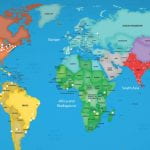For almost a year we have been called to distance and confinement. The whole of humanity has demanded from us an act of solidarity and community care that has placed us in complex dynamics of social isolation. While accumulated efforts are made to keep us close through digital media, the truth is that we have been denied the possibility to embrace, shake hands, look at smiles, to be gathered to celebrate life.
Faced with this reality, on Wednesday, February 17, I had a moment of deep consolation. It was midday and I went to the campus of the University of San Francisco to receive the ashes, because like every year, this is a moment in which we, the Catholic community, are invited to be silent, to look at the deserts of our lives, to reflect on our responsibility in the social wound that we are living today and that keeps “Jesus Christ on the cross”, even after two millennia of his existence.
In previous years, I would enter an almost empty chapel and take my ashes… “Believe in the Gospel. Rember you are dust and to dust, you will return.” This year was different, Father Donal Godfrey, S.J., stood outside the offices of University Ministry, with a mask, antibacterial gel, and the ashes on one side; opening from a distance space for the encounter, to begin one of the most significant times of our community. And so it was.
A consolation was just around the corner. I decided to go to the cafeteria to buy something to eat before returning to the daily confinement implied by the pandemic and a master’s thesis. There I was deeply surprised to see a couple of faces overwhelmed with surprise and joy from some of the cafeteria workers upon finding out that I had just taken my ashes. As if a world had opened up as if we had taken up that thread and needle to continue weaving our life in communion.
I told them that Fr. Godfrey was outside University Ministry and would be there until 1 pm. They were happy, but it was only 25 minutes before Father left. In my mind I thought, it’s lunchtime, the students will keep coming and they won’t be able to have a break. I went out and told the priest that there were a few people interested in the ashes. Unfortunately, he had to attend a meeting in a few minutes, but he said, “Here, take the ashes and give them to them.
I took the ashes with me and returned to the cafeteria, spoke to them from a distance, and explained that I am a resident minister at the University and that Father had instructed me to share the ashes with them. I asked them if they felt invited and would allow me to do so; as soon as I finished the sentence they answered yes.
The consolation was present at that moment, not only because it was a time of the face-to-face meeting at a distance, but because we found ourselves as a small Latin American community; from the beginning to the end we were one, Christians looking for those rites that make sense to us and give us security in the face of the uncertain. We used our language as a symbol of encounter and love. We pronounced the words to receive the ashes and we thanked each other. My heart swelled with gratitude for these less than 5 minutes of grace, to continue weaving community, to continue building a world in which we all belong, from tenderness, care, solidarity, and love.




